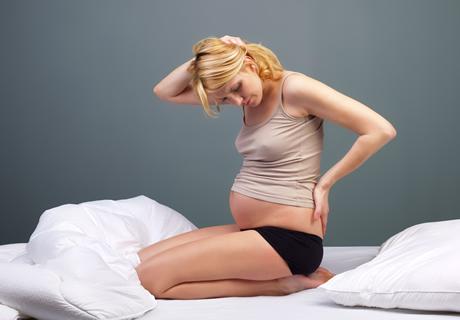Back pain is one of those pregnancy symptoms which you expect, but can never truly understand until you live it. This is because back pain from pregnancy is unique. Back pain from poor posture, a fracture, or a genetic condition all have their own distinct feelings, and pregnancy back pain is no different.
In pregnancy your back is aching for two reasons. First of all, your body is pumping out a hormone called relaxin. Relaxin is a wonderful thing. It literally loosens every collagen-based tissue in your body. This means that your abdominal muscles will stretch to fit your bump, your breasts can grow without tearing your connective tissue, your hips loosen to pass the baby through, and your skin gets looser all over to reduce tears and stretch marks. But relaxin can't pick and choose which parts need to relax! This means that the connections between your spinal disks will also relax, making them vulnerable to straining.
Secondly, your whole weight distribution is changing. As your bump grows and your hips loosen, your weight shifts forwards into your belly and down away from your hip. Much like continually carrying a backpack would do, this extra strain is pulling on your spine, putting you at risk of soreness and even injury. However just because these things are natural does not mean you have to put up with them!
When you are suffering back pains, remember that there are some painkillers which are safe to use when pregnant. Talk to your doctor about healthy doses of over the counter and prescription medicines, which could take away some of the pain, especially the inevitable pains from stretching.
Exercising can alleviate back pain. It may seem like you have no energy for exercise, but even if you just focus on one or two back building moves, it will make the world of difference. Some women find that performing exercises such as rows or bicep curls at a light weight does not interfere much with the bump, but allows them to make their upper back stronger, taking a lot of pressure off the lower back.
Eating right is essential for a strong back during pregnancy. For starters, you do not want to gain too much weight. You are gaining weight fast enough as it is, and any extra puts unnecessary pressure on your spine, risking injury and pain. But you also do not want to miss out on vital nutrients, as this can lead to muscle wastage and loss of bone density. Eat a diet high in micronutrients, with enough calories to sustain a healthy growing bump.
Avoid using clothes that are too restrictive. Because your weight distribution is changing, so is your center of balance. Your body is designed to handle this. You will slowly begin walking with more of a waddle, with your feet further apart, your hips swinging more, and your arms up to protect your bump. This not only allows your baby to grow quite big, but also makes you less likely to fall and get hurt.
When we use restrictive clothes such as corsets, fitted dresses, or high heels, we are putting ourselves at more risk of falling. These clothes interfere with the natural adaptations of our bodies. And the constant wobble of trying to avoid falling wreaks havoc on our spines!
Near the end of pregnancy, avoid the temptation to spend all day in bed. You may feel completely and utterly exhausted, but when it comes to muscle if you don't use it, you lose it. A little mild activity every day will protect you against developing a weak back, and will keep the joints lubricated, preventing back pains.
Finally, remember that pregnancy puts you at risk of osteoporosis. Although for many women this happens much later on in life, some women develop osteoporosis during pregnancy as a consequence of poor diet or genetic factors. If you feel that your spine is continually sore, or you feel a cracking pain in one specific area, see your doctor about this. Osteoporosis combined with the pressures of pregnancy puts you at serious risk of a spinal fracture, so you need to keep an eye out if you develop early osteoporosis.


 20 Super Foods That Will Help You lose weight
20 Super Foods That Will Help You lose weight